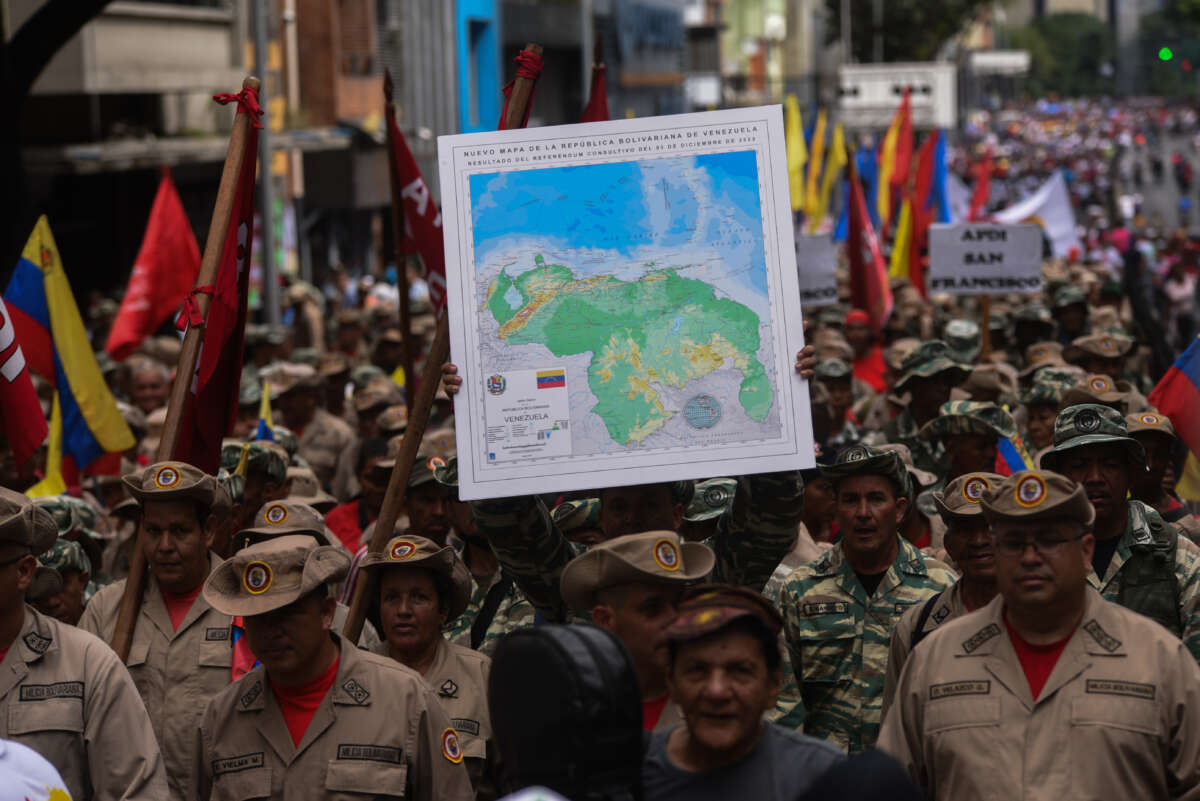U.S. forces held joint military drills within Guyanese airspace on Thursday as a longstanding and intensifying territorial dispute between Venezuela and Guyana sparked fears of war in South America.
At the center of the dispute is Essequibo, an oil-rich region that Guyana has controlled for more than a century. Venezuela has claimed sovereignty over Essequibo for decades, and the two nations agreed in 1966 to resolve the controversy in a way that’s “satisfactory” for both sides.
On Sunday, 95% of Venezuelan voters approved a referendum in support of declaring ownership over the disputed territory, and President Nicolás Maduro swiftly “ordered the state oil company to issue licenses for extracting crude in the region,” AFP reported.
“The president also gave an ultimatum to oil companies working under concessions issued by Guyana to halt operations within three months,” the outlet added.
Irfaan Ali, Guyana’s president, called Maduro’s moves a “direct threat” and said his country’s military forces are on alert.
“Our first line of defense is diplomacy,” Ali said in an interview with CBS News on Wednesday. “But we are also preparing for the worst-case scenario… We are preparing with our allies, with our friends, to ensure that we are in a position to defend what is ours.”
The United Nations Security Council was scheduled to hold an emergency closed-door meeting on the dispute on Friday at Guyana’s request.
The primary target of Maduro’s ultimatum to companies was ExxonMobil, a U.S.-based fossil fuel giant that has made major new oil discoveries in the disputed territory this year. Exxon announced its first oil discovery in Guyana in 2015, and the country’s government gave the oil behemoth a green light to drill in disputed waters.
Citing an industry analyst, The Houston Chronicle reported earlier this week that “the roughly 380,000 barrels per day that Exxon produces in Guyana account for roughly 10% of its 4 million barrels per day globally.”
“The company plans to expand its production there to more than 1 million barrels per day by the end of the decade,” the Chronicle noted.
Escalating tensions over Essequibo have sparked warnings of a possible military conflict in the region. Brazilian President Luiz Inácio Lula da Silva said Thursday that “if there’s one thing we don’t want here in South America, it’s war.”
“We have been following the development of the Essequibo issue with growing concern,” Lula said, expressing his nation’s willingness to assist in negotiations for a diplomatic resolution. “We don’t need conflict. We need to build peace.”
Brazil shares a border with both Venezuela and Guyana. The BBC reported that Brazil deployed troops to its border with Venezuela following Sunday’s referendum vote.
On the same day as Lula’s remarks, American forces held joint military drills with Guyana that the U.S. Southern Command (SOUTHCOM) said were part of “routine engagement” aimed at enhancing the two nations’ “security partnership.”
“The U.S. will continue its commitment as Guyana’s trusted security partner and promoting regional cooperation and interoperability,” SOUTHCOM added.
Vladimir Padrino Lopez, Venezuela’s defense minister, called the drills an “unfortunate provocation” aimed at protecting the interests of ExxonMobil.
“We warn that we will not be diverted from our future actions for the recovery of the Essequibo,” Lopez wrote on social media.
Historian Vijay Prashad argued earlier this week that “war does not seem to be on the horizon,” given that the U.S. has recently “withdrawn part of its blockade on Venezuela’s oil industry, allowing Chevron to restart several oil projects in the Orinoco Belt and in Lake Maracaibo.”
“Washington does not have the appetite to deepen its conflict with Venezuela. But ExxonMobil does,” Prashad wrote. “Neither the Venezuelan nor the Guyanese people will benefit from ExxonMobil’s political intervention in the region. That is why so many Venezuelans who came to cast their vote on December 3 saw this less as a conflict between Venezuela and Guyana and more as a conflict between ExxonMobil and the people of these two South American countries.”
Press freedom is under attack
As Trump cracks down on political speech, independent media is increasingly necessary.
Truthout produces reporting you won’t see in the mainstream: journalism from the frontlines of global conflict, interviews with grassroots movement leaders, high-quality legal analysis and more.
Our work is possible thanks to reader support. Help Truthout catalyze change and social justice — make a tax-deductible monthly or one-time donation today.
